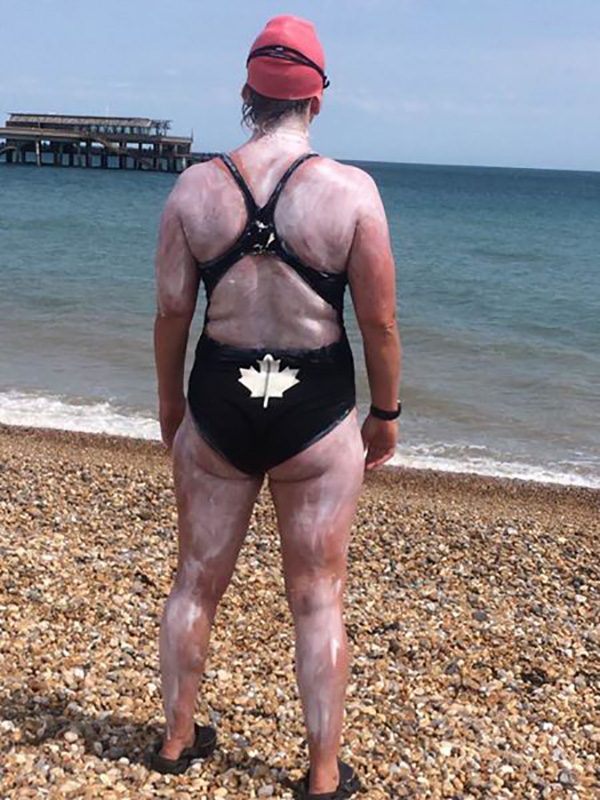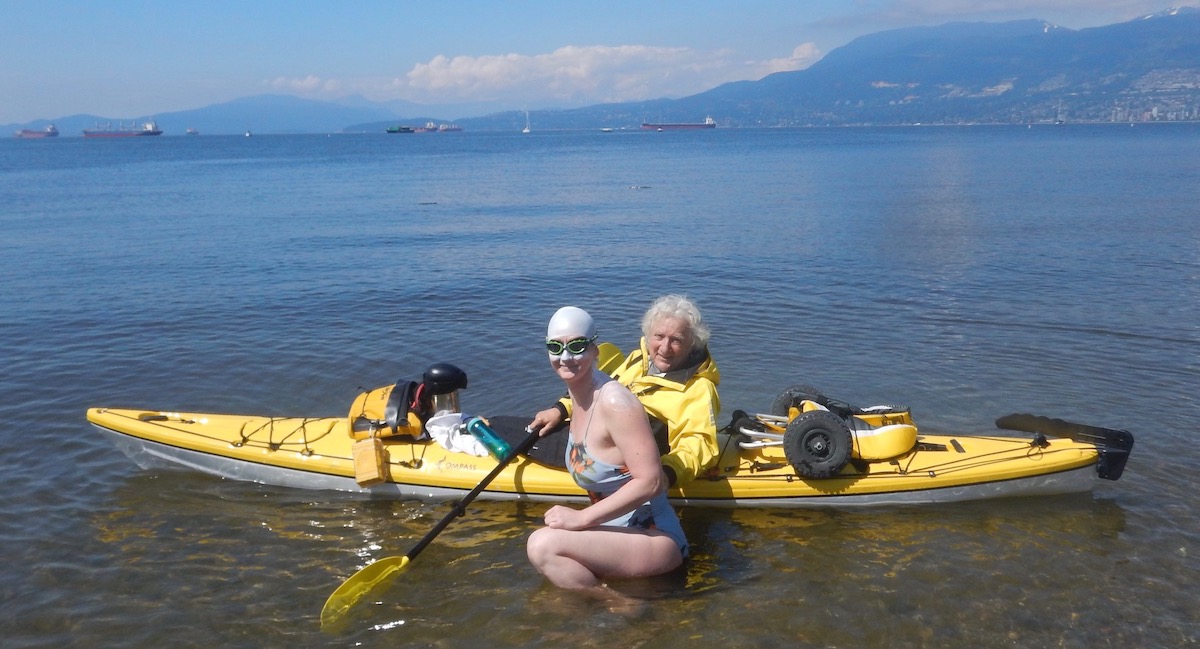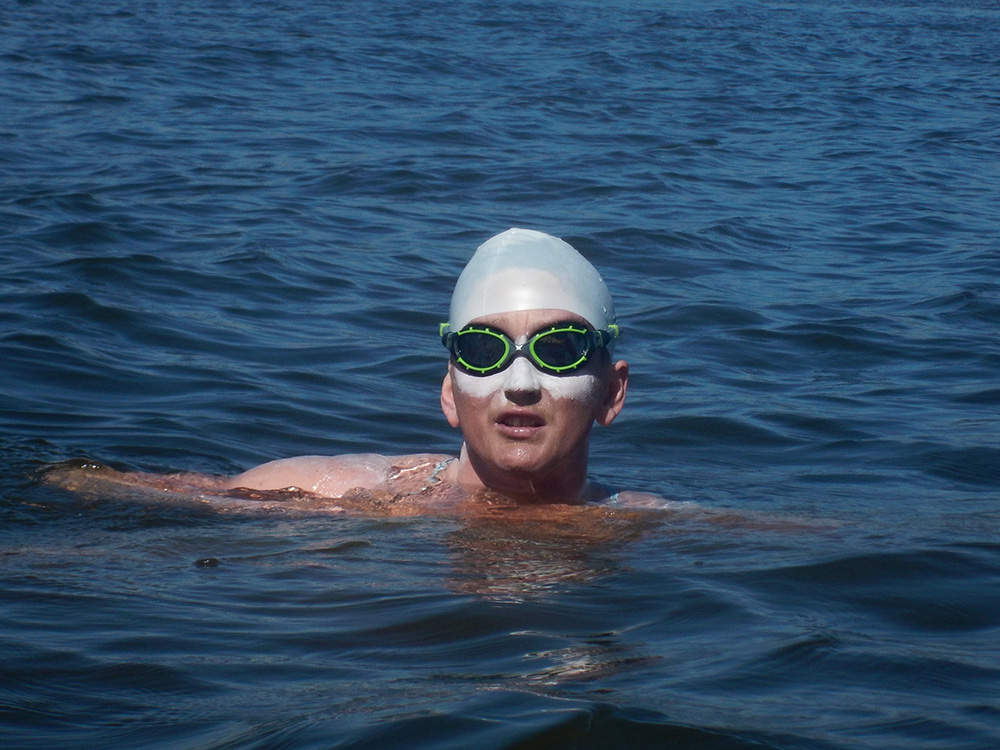You’ve probably never heard of Jessi Harewicz.
But in the world of long-distance swimming the 36-year-old Vancouver woman is a megastar. Harewicz, a latecomer, is one of about 200 people in the world to have captured the Triple Crown of open-water swimming.
In June, she completed the last of the three challenges by battling tides, waves and pollution in a 42-kilometre swim around Manhattan.
Harewicz had already crossed the English Channel, spending almost 20 hours in the water.
And she had battled through the Pacific Ocean to swim the 32 kilometres from the California mainland to Catalina Island.
She also found time to swim from Sechelt to Nanaimo.
Harewicz was first drawn to the ocean when she started to train for a triathlon in 2015 and was diagnosed with a hip condition that limited her opportunities in the sport.
That didn’t stop her.
“I just found something else to do,” she said. “It’s just a matter of discovering what’s available in British Columbia for training because I wanted to have an interesting life.”
Harewicz juggles swimming with a nine-to-five job and trains before and after work. Sleep — “part of the training,” she says — and rest and recovery are included in the regimen.
Training can include about 18 hours in the water during peak season, about 10 hours on average. She tries to take a couple of months off in the fall.
The Tyee caught up with Harewicz between swims. The interview has been lightly edited for length and clarity.
The Tyee: You swam around Manhattan! What was that like, compared to swimming in British Columbia’s waters?
Harewicz: It didn’t feel as different as I thought it would. It was great to see New York by water, but you’re kind of focused on swimming, so you’re trying to keep your head down. But it was a great swim.
Halfway through, once I knew I was going to be able to get around it, it was just really nice to see. B.C. is beautiful, and I see a lot of nature here, but it was really nice to be able to swim around an urban environment, because in Vancouver it’s not clean to swim where the city meets water’s edge.
You don’t wear a wetsuit while swimming around B.C. Why not?
Three-and-a half-years ago, when I decided to swim the English Channel, I made the decision to get out of my wetsuit.
Basically, there are traditional English Channel rules. Matthew Webb, the first guy who swam [the] English Channel in 1875 did so when there were no wetsuits. So there’s a tradition.
Wetsuits were developed in the 1950s for military technology, and they were designed for divers to keep them warm in great depths. It’s easier mentally and physically when you are warmer.
When I decided that I was going to take on the English Channel, that’s when I knew I had to get rid of my wetsuit. I went to a swim camp in Spain and I got totally hooked on distance swimming. And I was told, “Once you get out of the black, you never go back.”
If it’s too cold to go in, I won’t go in.
I have to force myself, with all the warm clothes waiting at the shoreline. It’s physical, but also takes a lot of mental strength.
Because you are basically naked in the ocean. You are vulnerable to a lot more stuff.

What are some misconceptions that people have about swimming in open waters here?
People don’t think the water temperature changes much. I’m not concerned with 10 feet down where divers go. That’s why they wear wetsuits.
I’m concerned with the surface, and the surface in B.C., depending where you are, ranges all the way from five or six degrees in February, March, and then in the summertime it can go up to 18 to 21 degrees, depending on water movement and depth.
A lot of people don’t realize that we actually have warmer water in the summertime than even Seattle, because of the Fraser River influence and all the other freshwater influences that we have. That tends to heat up the top layer of the water in the summertime.
The whole big bay we live in, not just English Bay but all the way out to [the] Georgia Strait, it does warm up quite a bit depending on weather, climate and water movement. So I think that’s one of the biggest misconceptions.
Another misconception is that people think there are sharks and whales. Yes, we have some jellyfish, but we are relatively safe.
How clean is the water here, and what sort of things do you encounter?
Wildlife — birds, seals, fish and kelp — are common sights in and around the Salish Sea.
Sometimes I run into garbage. I have swallowed gas, like off the boats here. We have a busy harbour, right? I’m not swimming in the middle of the harbour, but there is stuff floating on the surface.
What would you say to those who are hesitant about swimming in B.C.’s ocean waters?
I would definitely advise people to do their research. There is a lot of content online. They can learn from experienced swimmers.
And get a mentor. Mentorship is kind of an unwritten rule, it’s more of a tradition from England. You mentor other swimmers because you have seen so much, like mentally and physically. Get a supportive team to accompany you. And always take time out and work on your technique in the pool.
There are different sources out there, like contacting people on social media. I have reached out to people and found the community to be very welcoming.
We are a sport that celebrates adversity through thick and thin. That’s the one thing I love about channel swimming.
What keeps you going back to the water?
When people ask me why swim, I point to the ocean. I say, “It’s there. It’s right there.”
I swim because of the other channel swimmers that I’ve met along the way. I swim because of all the random kind people I’ve met around the world. I swim because of my family that supports me, the relationship that me and my dad have redeveloped as a swimmer and a kayaker. He has been on all my boat crews, and my mom comes on shore swims with me in the mornings.
I think it brings a small portion of the population together. If you look up channel swimming, it has always attracted interesting people. It can attract fast people and slow people, but it is not for the faint-hearted.

Have you ever seen a whale while swimming?
No. I swam with dolphins when I was in the Catalina Channel, so that was interesting.
I kick things occasionally, bump into things, and sometimes seals come to hang out and swim. Harbour seals are quite curious. Sometimes they are afraid of humans, they don’t like boats and loud noises. But I had a seal come and swim with me the other day and I wanted to get a picture, but they are so cheeky and go so fast. They can swim with me for hours.
It just depends. If we don’t have a boat and it’s just a swimmer and a kayak and it’s very quiet, we find that a lot more wildlife will come around.
I’ve never run into whales, but eventually, who knows? ![]()
















Tyee Commenting Guidelines
Comments that violate guidelines risk being deleted, and violations may result in a temporary or permanent user ban. Maintain the spirit of good conversation to stay in the discussion.
*Please note The Tyee is not a forum for spreading misinformation about COVID-19, denying its existence or minimizing its risk to public health.
Do:
Do not: